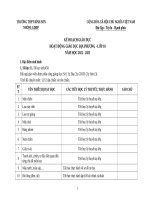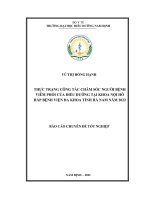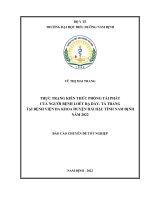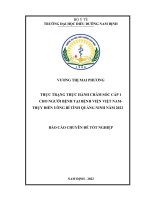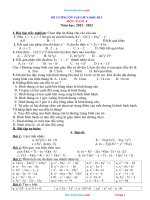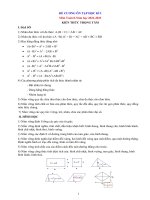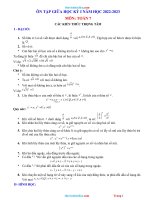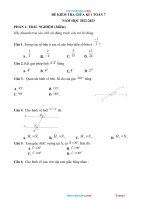Vietnam Property Development Guide 2022
Bạn đang xem bản rút gọn của tài liệu. Xem và tải ngay bản đầy đủ của tài liệu tại đây (1.09 MB, 16 trang )
VIETNAM
Property Development Guide
June 2022
Contents
Abbreviation .......................................................................................................................................... 1
Introduction ........................................................................................................................................... 2
General rules for foreign investors ..................................................................................................... 2
Market access conditions for foreign investors in the real estate business ......................................... 2
Rules for conditional sectors ................................................................................................................ 3
Treatment of an FIEO (FIE / FOC) having over 50% foreign-owned capital ....................................... 3
Treatment of FOCs with foreign investor status under the Real Estate Business Law and the
Housing Law ........................................................................................................................................ 3
Investment forms for foreign investors ................................................................................................. 4
Several conditions for enterprises to conduct real estate business .................................................... 5
General procedures for developing a real estate Project ................................................................. 5
Phase 1: Preparing for investment ...................................................................................................... 6
Phase 2: Implementation of real estate Projects ................................................................................. 8
Phase 3: Put the Project into operation ............................................................................................. 11
Contact Us ........................................................................................................................................... 14
Abbreviation
DOC
Department of Construction
DOF
Department of Finance
DONRE
Department of Natural Resources and
Environment
DPA
Department of Planning and Architecture
DPI
Department of Planning and Investment
FDI
Foreign Direct Investment
HCMC
Ho Chi Minh City
IRC
Investment Registration Certificate
LURC
Certificate of Land Use Right and Ownership of
House and Other Assets
MOC
Ministry of Construction
PC
People’s Committee
US$
United States Dollars
VND
Vietnamese Dong
WTO
World Trade Organization
Vietnam Property Development Guide
Page 1
Introduction
From 1 January 2021, a large number of new legal regulations related to various fields came into
effect in Vietnam. These regulations brought major changes to sectors such as investment,
construction, residential housing, real estate business and include:
The 2020 Investment Law (the “Investment Law”);
The 2020 Law on Environmental Protection (the “Environmental Protection Law”);
The 2014 Housing Law (the “Housing Law”);
The 2014 Construction Law and its amendments (the “Construction Law”);
The 2014 Real Estate Business Law (the “Real Estate Business Law”); and
The 2013 Law on Bidding (the “Bidding Law”).
According to the real estate market report of the MOC, the amount of real estate inventory in the third
quarter of 2021 is estimated at 15,067 units, demonstrating that the absorption capacity of the real
estate market has decreased, compared to the previous quarter.
By the end of September 2021, the total registered capital for new, adjusted, and contributed capital to
acquire shares or capital contributions of foreign investors reached US$22.15 billion, which was an
increase of 4.4% over the same period in 2020.
Statistics of the MOC also show that foreign investment in the real estate market increased gradually
from the end of March to September 2021 from US$0.6 billion to US$1.78 billion. Accordingly,
accumulated registered capital in the real estate sector tends to increase gradually by
quarter. Another positive signal is that the number of newly established real estate businesses in the
first nine months of 2021 also increased by 11.5% compared to the same period in 2020. Vietnam is
still well-positioned to attract FDI into the real estate business.
This Guide focuses on the property development procedures for a foreign-invested enterprise /
foreign-invested economic organization / foreign-owned company as defined under the Investment
Law (“FIE” / “FIEO” / “FOC”) to develop real estate Projects (the “Project”).
General rules for foreign investors
Market access conditions for foreign investors in the real estate business
Real estate business is not a business sector that Vietnam committed to allow foreign investors to
freely and unconditionally access under the WTO Commitments. Therefore, market access conditions
applicable to foreign investors in real estate business will be provided by the specialized local laws 1,
such as the Investment Law, the Real Estate Business Law, the 2013 Law on Land (the “Land Law”),
1
Article 17.4(b), Decree No. 31/2021/ND-CP dated 26 March 2021 on detailing and guiding the
implementation of several articles of the Investment Law.
Vietnam Property Development Guide
Page 2
the Housing Law, and other relevant regulations. Those laws allow FIEs / FOCs to invest in real estate
business without a foreign capital restriction.
Rules for conditional sectors
Real estate business is one of the sectors in which business investment is conditional for all investors
with no distinctions between foreign and domestic source2. Any organization or individual wishing to
conduct real estate trading must set up an enterprise or cooperative3. As such, a foreign investor must
either establish an economic entity (a FOC) which requires compliance with market access conditions
under Article 22 of the Investment Law4, or contribute capital or purchase shares / capital contribution
portions, i.e., to acquire equity, in a duly incorporated and operating Vietnam-based enterprise under
Article 25 of the Investment Law.
Treatment of an FIEO (FIE / FOC) having over 50% foreign-owned capital
FIEOs are those having a foreign investor as a member or shareholder5. The following FIEOs shall be
subject to investment conditions and procedures applicable to a foreign investor6:
(a)
having foreign investor(s) holding more than 50% of its charter capital (or having a majority of
their general partners being foreign individuals or partnership companies);
(b)
having economic entity(ies) as described in item (a) above holding more than 50% of its
charter capital; or
(c)
having foreign investor(s) and economic entity(ies) as described in item (a) holding more
than 50% of its charter capital.
Those FIEOs which do not fall into the above cases will be able to conduct investment activities as a
Vietnamese local company, i.e., being equally treated as a domestic investor.
Treatment of FOCs with foreign investor status under the Real Estate
Business Law and the Housing Law
The general rules and restrictions for property ownership by foreigners (individuals and corporate
entities) restrict the activities of foreign investors within the sector as follows (the “Ownership
Restrictions”):
2
Article 7 and Appendix 4, the Investment Law.
3
Article 10, the Real Estate Business Law.
4
i.e., “satisfying market access conditions applicable to foreign investors, having investment
plan, implementing procedures for IRC obtainment”.
5
Article 3.22, the Investment Law.
6
Article 23.1, the Investment Law.
Vietnam Property Development Guide
Page 3
(a)
FIEs / FOCs investing in the construction of houses / apartments for sale can own, sell and
lease the houses / apartments to eligible purchasers in Vietnam. In other words, such FIEs /
FOCs act also as the developer of its real estate Projects7;
(b)
FOCs investing in the construction of houses / apartments for lease in Vietnam can own their
buildings. The duration of the ownership, however, is the duration stated in their IRC and
LURC and has a maximum of 50 years which can be extended in certain circumstances (but
not to exceed 70 years in any cases) 8;
(c)
FOCs (not conducting real estate business) can only own houses or apartments in real estate
Projects for their staff to reside in9. However, the total number of houses or apartments owned
by such an FOC within an apartment building or a ward is subject to statutory limitations. The
duration of ownership must not exceed the duration of the IRC of such FOC 10;
(d)
Foreign individuals who are allowed to enter Vietnam can own houses or apartments in real
estate Projects for a period of up to 50 years (renewable), i.e., on a leasehold basis only 11;
(e)
Generally, foreign individuals and entities who are entitled to own houses in Vietnam enjoy
the right to resell, lease, mortgage, contribute as equity in companies, exchange, and other
legitimate rights conferred upon their owned houses/apartments; and
(f)
Unlike a local company or a Vietnamese citizen, if an FOC is not the developer of a real
estate Project (as mentioned earlier), it is not permitted by the local laws, among others, to12:
(i)
purchase buildings for sale, for lease, or for lease purchase; and
(ii)
conduct real estate trading activities in the case of land transferred or leased from
organizations, households, or individuals, i.e., purchase land or properties from
others for trading or resell.
The above Ownership Restrictions do not apply to domestic individuals and organizations which are
able to invest in all forms of land that are allowed under the laws.
Investment forms for foreign investors
There are commonly two forms of investment that foreign investors might consider when investing in
real estate in Vietnam, including:
(a)
Establishing a real estate business enterprise with foreign-owned capital; or
7
Article 159.2(a), the Housing Law.
8
Article 44.2, the Investment Law.
9
Article 162.2(b), the Housing Law.
10
Article 161.2(d), the Housing Law
11
Article 161.2(c), the Housing Law.
12
Article 11, the Real Estate Business Law.
Vietnam Property Development Guide
Page 4
(b)
Contributing capital or purchasing shares or capital contribution portions in local real estate
enterprises, i.e., to acquire equity of a local entity.
Specifically, for the above-mentioned Projects, once the investment policy and the investor of the
Project are approved or the selection of the investor is completed, the provincial PC shall consider
and decide on the permissions for the Project to be implemented first, then the construction
procedures, labor, land, and other relevant procedures to follow. These procedures are under the
competence of the provincial PC or the Management Boards of industrial zones, departments
prescribed in relevant laws. In this case, the investor must commit to the progress of completing the
procedures and take full responsibility if it does not comply with the conditions and regulations as
prescribed under applicable laws.
Several conditions for enterprises to conduct real estate business
Organizations and individuals conducting real estate business must satisfy the conditions as specified
in Article 4 of Decree No. 02/2022/ND-CP. In addition, depending on the land size, a property
developer shall be required to obtain at least 15% or 20% of the total investment capital. It is however
important to note that the calculation of such investment capital is based on the most recently audited
financial statements or independent audit report of the project company / developer made in the year
or the year preceding. In the case of a newly established company, the investment capital is
determined according to the actual charter capital contributed by the members / shareholders of such
project company / developer.
General procedures for developing a real estate Project
The entire process of developing a real estate Project is governed by relevant legal documents such
as laws on investment, planning, bidding, construction, land, housing, real estate business,
etc. Depending on the nature, sector, scale of investment, current status of planning, and land use
needs, each Project will be carried out in different steps and procedures. Therefore, it is difficult to set
out a unified process that applies to all types of Projects.
Real estate development often takes a long schedule from the start day of the Project to the date on
which the developer can launch the sale of the product. Normally, it takes about two to three years
from receipt of land (by a lease / allocation decision) to complete the compensation for land
clearance; one to two more years to implement investment procedures such as applying for approval
of investment policies or recognition of investor, detailed planning of 1/500 ratio; fulfilling financial
obligations necessary to receive the land use right certificate. Finally, it takes from two to three years
to complete the construction works of the Project. With this process, the approval of the Project
investor is an extremely important stage, starting from the auction of land use rights, bidding for
Projects, or appointing investors of real estate Projects. It is also one of the major obstacles and the
main bottleneck that prevents investors from developing new Projects.
The general procedures for developing a real estate Project shall be as follows:
Vietnam Property Development Guide
Page 5
Phase 1: Preparing for investment
Prior research
Investors need to conduct research to survey market demand, the need, and the possible value when
beginning to invest. A suitable location is also worth consideration.
Finding a suitable location
The investors must conduct a survey and examine the location carefully to determine whether it’s in
line with their investment needs. Some common criteria for investors to evaluate include answers to
the following questions: Is the Project compatible with the general planning of that area? Does the
Project’s location have the detailed master planning 1/2000 or 1/500 planning? If not, the investor has
to make a proposal to the local authorities for planning.
Proposal of the investment Project
According to Article 33.1(d) of the Investment Law, the dossier for the investment Project must
comprise the following main contents: investor or form of investor selection, investment objectives,
investment scale, investment capital and plan for raising capital, location, duration, investment
schedule, information about the current status of land use at the Project’s location and proposal for
land use demand (if any), labor demand, proposal for investment incentives, impact and socioeconomic efficiency of the Project, and preliminary assessment of environmental impact (if any) under
the Environmental Protection Law.
Vietnam Property Development Guide
Page 6
If the Construction Law requires a pre-feasibility study report, the investor may submit the prefeasibility study report instead of the investment Project proposal.
According to current regulations, the planning task belongs to the competent authority (except for the
detailed construction planning of particular-function zones assigned to the developer under Article
24.3 of the Construction Law). However, the investor can still actively propose funding the planning
process provided that the form of sponsorship agreement is allowed by the laws and its contents must
not be contrary to the public interest. The selection of planning organizer, consultant, and the
procedures thereof must follow the Construction Law and the Bidding Law. It is important to note that
the investor's funding for the planning process is not a prerequisite for the Project’s developer
status. The funding for planning as mentioned has been guided by the MOC in Official Dispatch No.
5132/BXD-QHKT dated 22 October 2020.
Notes: For real estate development Projects, the Project proposal must also be in line with the
national housing development strategy, construction master plan, land-use master plan, and
compatible with the local housing development program / plan and urban development program in
each specific stage. Projects for real estate development shall only be made, approved, and
implemented in areas where detailed planning has been approved. Also, it must comply with the
contents of decisions on the approval of investment policy issued by the state authorities and the
requirements specified in Article 14 of the Housing Law.
The proposal of Projects with land use must also abide by the land-use master plan and the housing
development programs under Article 33.3 of the Investment Law. If the original purpose of the
Project’s land use is not in conformity with the master plan, it is necessary for the developer to carry
out procedures for approval/decision on the adjustment of the purpose of the Project’s land use.
Pre-feasibility study report
In case the Projects are required to have a pre-feasibility study report under Article 52 of the
Construction Law, the investor may submit pre-feasibility study reports instead of investment Project
proposals13.
The procedure for choosing the investor of real estate Projects
Step 1
Conditions
The Government allocates,
The area has made
leases land for real estate
compensation, land
development
clearance
The Government allocates,
The area hasn’t made
Tendering for
Approval of an
leases land for real estate
compensation, land
selection of an
investor
development
clearance
investor
The land area already has
legal land use right
13
Step 2
Step 3
Auction of the land
use right
Appoint the investor
Article 33.1(d), the Investment Law.
Vietnam Property Development Guide
Page 7
Step 1
Conditions
Step 2
Investment Policy Approval
Investment Policy
Choosing the
is required
Approval
investor
Step 3
In case the investor hasn’t had the lawful right to use the land
Where the investor does not have the right to legally use residential land, the procedures for approval
of Investment Policy under the Investment Law are controlled by the DPI in coordination with an
expert group (led by the DPI, members including relevant departments, branches, and districts). The
DPI shall consider and appraise dossiers and submit their internal proposal to the PC for the issue of
Investment Policy Approval under regulations. Once the approval of the Investment Policy is issued,
the investor shall make a detailed planning dossier of 1/500 or the agreement on the architectural
master plan of the architectural plan. At this stage, the DPI and the district PC are responsible to
advise the PC and organize the implementation as prescribed by the laws.
Step
Content
Authority in charge
1.
Procedures for Decision on approval of investment policy
PC, DPI
2.
Make detailed planning ratio 1/500 or agreement on master plan
DPA, district PC
of architectural plan
3.
Procedures for land allocation, land lease, change of land use
DONRE
purpose
4.
5.
Calculation of financial obligations, payment of land use fee,
DONRE in charge,
issuance of LURC
together with DOF
Recognition of the investor, approval of investment, appraisal of
DOC
basic design, technical design, issuance of Construction Permit
In case the investor has the lawful right to use the land
According to Official Dispatch No. 2363/SXD-PTDT dated 6 March 2020 issued by the Department of
Construction of HCMC, if the investor has the lawful right to use the land, the process of property
Projects will be regulated by the Housing Law. Thus, the recognition of the investor can be obtained in
parallel with the procedures for decision on approval of investment policy.
In reality, there are many property Projects with land originating as compensation of agricultural or
specialized land where there has been a document recognizing the investor of the HCMC PC, but
there is no investment policy approval nor procedures for recovery, land allocation and change of land
use purpose as prescribed. This causes a major legal problem for investors, resulting in capital
backlogs and reducing the business efficiency of investors as they have to suspend the Project to
review the legal procedures related to investors’ selection procedures.
After being chosen, the investor shall proceed to sign development contracts of the Project.
Phase 2: Implementation of real estate Projects
Complete the procedures related to land
Vietnam Property Development Guide
Page 8
After receiving a decision on the selection of investor / signing contracts for the implementation of the
Project, the investor shall coordinate with specialized agencies in submitting to competent authorities
for the issuance of a decision on land expropriation and a decision approving compensation, support,
and resettlement plans according to the Land Law. The investor shall submit the value of
compensation, support, resettlement, (M2) and the value of money paid to the state budget (M3)
proposed in the bidding dossier to the state management agency based on the progress of the Project
stated in the contract. The procedure for allocating the land for the investor to implement the Project is
provided in Decree No. 25/2020/ND-CP.
Some notes worth mentioning are as follows:
Article 1.12 of Decree No. 148/2020/ND-CP states that in case of exemption from the requirement for
payment of land use levies or land rents for some years, or the entire duration of land use for Projects
given investment incentives or located in areas qualified for investment incentives, competent
authorities may allocate, assign or lease land by neither the auctioning of land use rights nor the
bidding for Projects using land, except in the following cases:
(a)
Exemption from land use levies or land rents may only be granted during the Project’s capital
construction stage;
(b)
Land is used for commercial and service purposes; and
(c)
Land is used for carrying out property Projects (houses or apartment buildings).
The LURC shall be issued to the investors after all financial obligations to the Government have been
completed.
The procedure for construction14
(a)
Site preparation, demining (if necessary).
(b)
Construction survey (including two stages: preliminary surveys for investment reporting and
detailed surveys for design work).
(c)
The investor shall make the dossier for construction design which comprises of preliminary
design (in case of pre-feasibility study report), (1) base design (implemented during the
Project’s planning phase), and (2) technical design; and (3) construction drawing design and
other design steps (if any). Depending on the characteristic of the Project, the investor shall:
(i)
One-step design: three design steps (1), (2), and (3) are put together into one step
called construction drawing design (for Projects that only require economic-technical
reports);
(ii)
Two-step design: comprises of design steps (1) and (3) (for works required from a
Project); or
14
Article 50, the Construction Law; and Article 4, Decree No. 15/2021/ND-CP.
Vietnam Property Development Guide
Page 9
(iii)
Three-step design: comprises of design steps (1), (2), and (3) (for large and complex
Projects).
Note that the construction design shall be verified, appraised, and approved according to
Article 82 and Article 83 of the Construction Law.
The Construction Law has important adjustments related to the competence to appraise the
construction feasibility study report and the economic and technical report on construction.
Accordingly, the investor of certain types of works has the right to solely organize the
appraisal of technical design and construction drawing designs as it is not mandatory to carry
out procedures for appraisal of Project or construction design at the MOC or DOC.
(d)
Applying for a construction permit:
In addition to the construction permit, the developer shall carry out the procedures for making
and submitting the Project's environmental impact assessment report to the competent state
agency. The developer may carry out the procedures himself or hire a consultant to perform
the assessment. In any case, the developer is responsible before the law for the
environmental impact assessment submitted. For more information, Projects that require
environmental impact assessments are specified in the Environmental Protection Law, Decree
No. 18/2015/ND-CP, and Decree No. 40/2019/ND-CP.
The developer also needs to submit the dossier of fire prevention and fire fighting design for
approval as prescribed in Article 13 of Decree No. 136/2020/ND-CP, along with the facility
design profiles.
Some notes worth mentioning are as follows:
(i)
The period for issuance of a building permit is down to 20 days (decreased by 10
days compared to the former Construction Law);
(ii)
The condition for ensuring sufficient capital as provided in the construction schedule
has been removed. However, it is mandatory for the developer to send a notice of
commencement date to the local state on construction at least three working days
before the commencement of construction;
(iii)
For buildings where construction permits are required, the developer does not have to
carry out procedures for design appraisal and implementation after the facility at the
specialized construction agency (some contents of state management of construction
during the design appraisal period are considered at the construction permit step);
and
(iv)
The authority to grant construction permits has been assigned to local PC as
prescribed in Article 1.37 of the Law on amendment to the Construction Law.
(e)
Selection of contractors by bidding and signing construction contracts:
(i)
Selection of Project management consultants; and
Vietnam Property Development Guide
Page 10
(ii)
(f)
Selection of construction survey contractors.
Construction and construction supervision: Works before being constructed must meet the
conditions for commencement under Article 107 of the Construction Law, in which the
following must be satisfied: Construction permits as prescribed; design of construction
drawings of works items, a notice of commencement works is sent to the local state at least
three days before the commencement day; construction contract signed between the investor
and the general contractor; etc.
The organization of construction and construction quality management shall comply with the
Construction Law and its guiding documents.
(g)
Advance or pay according to the volume of works completed.
(h)
Acceptance of completion of construction works.
Phase 3: Put the Project into operation
Steps to be taken
Phase 3 includes the following steps:
(a)
Operation, testing;
(b)
Hand over the completed works for commissioning;
(c)
Payment and settlement of construction investment capital;
(d)
Auditing, verifying, and approving the settlement of construction investment capital.
(e)
Supervision and evaluation of construction investment Projects (in case of hiring consultants);
(f)
Operation license/ Industry opening / Operation authorization / Certificate of eligibility
(Projects in conditional investment sector);
(g)
Certificate of ownership of construction works/ ownership of houses;
(h)
Insurance, warranty, and maintenance of construction works; and
(i)
Sell the products to customers.
Conditions for investors to sell products in ground Projects
According to Article 194.1 of the Land Law, Article 41 of Decree No. 43/2014/ND-CP, and Article 1.17
of Decree No. 148/2020/ND-CP, once the developers have completed the construction of
infrastructure of the Project, the developers shall be allowed to sell their real estate products provided
that the sale of the divided lots is accepted and approved by the provincial PC beforehand. To achieve
that acceptance, all technical infrastructure according to the approved construction detailed
planning, ratio 1/500, and the financial obligations of the Project must be fulfilled.
In the case of urban development Projects, the land lots are only eligible for sale when they are not
located in the wards of special-type urban areas and Class I municipalities; areas with strict
requirements concerning landscape architecture, downtown areas, and proximities of facilities that
Vietnam Property Development Guide
Page 11
serve as prominent architectural points of cities; frontages of regional- or higher-level roads and main
landscape roads in cities.
Furthermore, all conditions applicable to real estate made available for trading as specified in Article 9
of the Real Estate Business Law shall also be satisfied.
Conditions for investors to sell products in apartment Projects
According to Article 118.1 of the Housing Law, conditions for houses / apartments to be traded are as
follows:
(a)
The LURC of the house being traded has been obtained;
(b)
The ownership rights are not the subject of any dispute, complaint, or legal action; the period
of the right of ownership has not expired if a limited period of ownership applies;
(c)
The house being traded is not distrained for judgment enforcement or for the execution of an
effective administrative decision of a State agency; and
(d)
The house being traded is not subject to a decision of a competent authority on land recovery
or a notice of demolition or clearance.
It is worth noting that the applicable laws do not require the house / apartment to be formed in the
future (off-plan property) to have its LURC, according to Article 118.2 of the Housing Law.
However, for real estate to be formed in the future (“off-plan property”) to be tradable, under Article
55 of the Real Estate Business Law, some conditions shall be satisfied as follows:
(a)
Having documents on the land use right, project file, design of shop drawings already
approved by competent authorities, construction permit (in cases where a construction permit
is required), and documents on check and acceptance of completion of construction of
technical infrastructure facilities corresponding to the schedule of the project. In the
case of an apartment building or mixed-use building complex with off-plan property, the
minutes of check and acceptance of completion of the foundations of such building
shall be required;
(b)
Before the selling or hire purchase of off-plan property, the developer must notify in writing the
provincial-level housing management agency with a written notice on the eligibility of the
residential house to be sold or hire purchased; and
(c)
Within 15 days from the date of receipt of the notice, the above agency shall give a written
reply to the developer regarding the eligibility of the residential house to be sold or hire
purchased; or the reasons for properties that fail to satisfy the conditions.
The parties also need to satisfy some specific conditions to enter into transactions as stated under
Article 119 of the Housing Law.
Templates of contracts to be used in the real estate project
Vietnam Property Development Guide
Page 12
Article 6 of Decree No. 02/2022/ND-CP specifically regulates that the selling, transferring, leasing,
lease purchasing, sub-leasing real estate, as well as transferring real estate projects must “be made
in the contract forms” provided in such Decree.
Rules for transfer of real estate projects to another investor (optional)
The rules for transferring real estate projects are specified in Article 9 of Decree No. 02/2022/ND-CP.
Particularly, (i) Article 9.2 provides that the project that has been granted with the approval of the
investor (or “chấp thuận nhà đầu tư” in Vietnamese) or the IRC under the Investment Law, the transfer
shall be regulated by the relevant regulations on investment; and (ii) the transfer of other real estate
projects15 which are not specified under Article 9.2 shall be carried out following the Real Estate
Business Law and Decree No. 02/2022/ND-CP16. Also, Article 9.1 of Decree No. 02/2022/ND-CP
emphasizes a condition for the project to be transferred, which applies in case of such project being
implemented “on schedule”.
15
Projects that already have investment policy decisions, investment decisions, approval of the
investment project, or any other document with equivalent validity under the 2005 Investment
Law and/or the 2014 Investment Law or projects for which the investors are chosen by
auction or tendering without conducting the procedure to issue an IRC shall apply the
regulation relating to real estate business when transferring the projects.
16
Article 9.3, Decree No. 02/2022/ND-CP.
Vietnam Property Development Guide
Page 13
Contact Us
For more information or assistance, please contact us:
Le Nguyen Huy Thuy
Dang The Duc
Partner
Managing Partner
Ton That Hoang
Le Van Duong
Legal Assistant
Partner, Head of Hanoi Office
Ho Chi Minh City
Hanoi
Unit 305, 3rd Floor, Centec Tower
Unit 705, 7th Floor, CMC Tower
72-74 Nguyen Thi Minh Khai, District 3
Duy Tan Street, Cau Giay District
Ho Chi Minh City, Vietnam
Hanoi, Vietnam
T +84 28 3823 9640
T +84 24 3795 5261
F +84 28 3823 9641
F +84 24 3795 5262
E
E
www.indochinecounsel.com
The information contained herein is of a general nature and is not intended to address the circumstances of any
particular individual or entity. Although we endeavour to provide accurate and timely information, there can be no
guarantee that such information is accurate as of the date it is received or that it will continue to be accurate in
the future. No one should act upon such information without appropriate professional advice after a thorough
examination of the particular situation.
The content of this Property Development guide is current as at June 2022.
© 2022 Indochine Counsel. All Rights Reserved.
Vietnam Property Development Guide
Page 14
